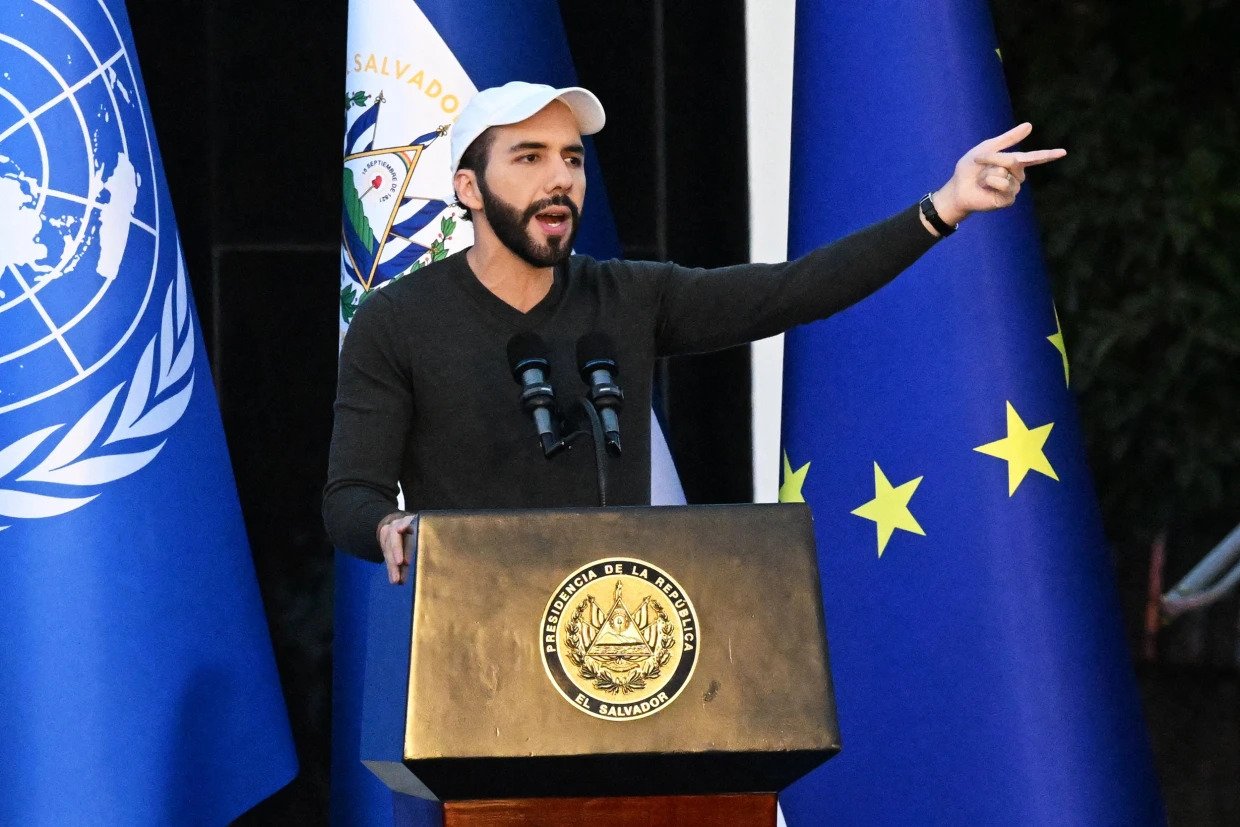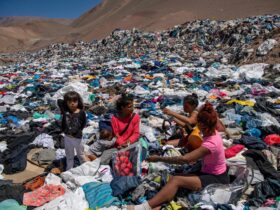If you Google the president of El Salvador, you would be greeted by images of a young man wearing aviators, a bomber jacket and a backwards baseball cap. That man is Nayib Bukele, the so-called “millennial authoritarian” of El Salvador. Known for his casual attire, frequent use of social media platforms such as X (formerly known as Twitter) and extreme anti-gang policies, Bukele is becoming a star amongst right wing politicians and supporters in Latin America. Bukele is overwhelmingly popular, with a domestic approval rating that has consistently been over 75%, sometimes even breaching 90% and making him the highest approved president in El Salvador’s history. He has also amassed international support in the form of pro-Bukele marches and statements of support from politicians in other Latin American countries with high levels of violence. Nearly 70% of Salvadorans polled in support of Bukele seeking reelection.
However, the political marvel of Bukele’s success does not come without its drawbacks. Not only has his government committed a number of human rights violations under the consistently extended state of emergency/exception that has now lasted for a year and a half, but his recent push within the Salvadoran judicial system to allow his unconstitutional bid for reelection threatens the already weakened democracy in the country.
So, who is Nayib Bukele? Why has he been able to systematically rid El Salvador’s democracy of checks and balances, and even go against the constitution with the support of his people? How does his casual dress and social media usage contribute to his success?
Born in San Salvador in 1981, Bukele is amongst the oldest of the millennial generation, making him 42 years old as of 2023. He originally pursued a career in business but soon transitioned into politics, becoming the mayor of a small principality outside San Salvador called Nuevo Cuscatlán in 2012 on the Farabundo Martí National Liberation Front (FMLN) ballot, the country’s main leftist party. However, during his time in this office, Bukele clashed with party leadership over policy disagreements. Despite their displeasure with his policy and conduct, the FMLN could not pass up on his popularity and put him up as their candidate for mayor of San Salvador, the country’s capital. Bukele was elected in 2015, but this position marked the end of his association with the FMLN. The party expelled him, citing their assertion that he sowed division within the party and, at some point, physically attacked another member of the party.
This marked a change in the trajectory of his political career. Bukele soon began his campaign for president, running under the Grand Alliance of National Unity (GANA) because his new party, Nuevas Ideas, did not register in time to put up a candidate.
His win in 2019 was historic. It was the first time in the near thirty years since the end of El Salvador’s brutal civil war that the country’s two main parties, the FMLN and Nationalist Republican Alliance (ARENA), were not in control of the presidency. Salvadorans saw this as a much-needed relief from the stifling two-party system that failed to address issues of corruption and violence.
In his first year in office, Bukele quickly began implementing his tough-on-crime policies. His “Territorial Control Plan” lacked support in the legislature, as the GANA party controlled only 10 of the 84 National Assembly seats, the rest of which were held primarily by the FMLN and ARENA. Bukele wasted no time in using his power as president to get his way, entering the National Assembly’s chamber surrounded by armed forces members, then sitting in the chair reserved for the president of the assembly and demanding they support his policy. This stunt was immediately criticized for intimidating the legislature, and El Salvador’s highest court told President Bukele to refrain from similar actions in the future.
While the first few years of his presidency were hindered by an opposition-controlled legislature, El Salvador’s 2021 midterm legislative elections could not have gone better for Bukele and his Nuevas Ideas party. The party won 56 out of 84 seats in the National Assembly, giving Bukele an important majority.
Bukele immediately began to dismantle important democratic checks and balances upon gaining legislative control. His party quickly replaced all judges of the country’s Constitutional Chamber of the Supreme Court and replaced the Attorney General, then unconstitutionally appointed 5 new judges to the supreme court, giving Nuevas Ideas control of 10 of the 15 seats. Other laws which undermined judicial power throughout the government followed suit, and the new legislature also shelved many progressive bills related to issues such as abortion and gender affirmative care.
Nuevas Ideas posits that its ideology is neither right or left wing, and instead challenges the entire system developed after the 1992 peace accords. However, Bukele has failed to align himself with or agree with the narratives of leftist presidents in the region, such as Brazilian President Lula or Nicaraguan President Ortega. He has instead spoken and agreed with right wing world leaders including Donald Trump, Xi Jinping, Recep Tayyip Erdoğan, and, as mentioned, pursued conservative social policies.
As he nears the end of his five year term, Bukele is once again making the news due to his decision to run for reelection. Although the Salvadoran constitution outlaws reelection, the Bukele-controlled Supreme Court ruled that the President is allowed to run for reelection once. Soon after, Bukele announced his intent to run, and officially registered for the election in October. The decision has seen widespread disapproval amongst human rights groups, but Bukele maintains high domestic support for the decision.
Aside from his authoritarian behavior regarding democratic institutions, the main critiques of Bukele and his government center on the anti-gang policies. As of September, over 72,000 Salvadorans have been arrested under the state of emergency, and the government continually failed to ensure protection of both civil and human rights for those arrested. Cases of foreign nationals being wrongfully arrested and the legislature’s decision to permit mass trials are concerning to human rights and pro-democracy groups.
President Bukele has dramatically changed not only El Salvador, but the state of politics throughout Latin America. As other politicians aim to recreate Bukele’s security “success,” the entire region faces threats of democratic backsliding and humanitarian crises. Some leaders in the region have even begun to mimic Bukele’s style of dress and social media strategy, attempting to rile up the same levels of support.
All eyes are on El Salvador as it approaches the 2024 election. What the future is for Salvadorans if they cross this unconstitutional line is yet to be determined, and its ripple effect on the region as a whole may determine the future of democracy in the region.







